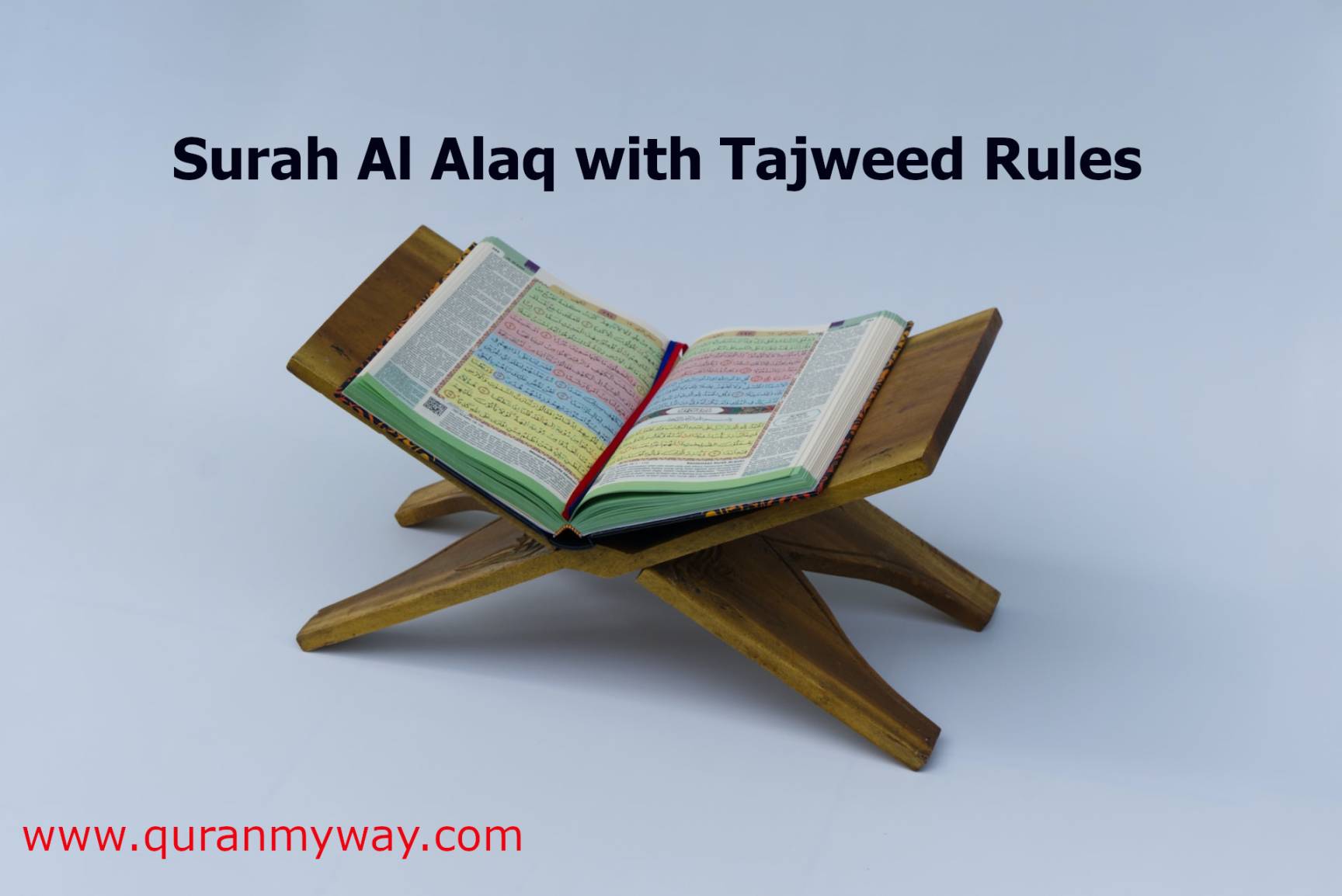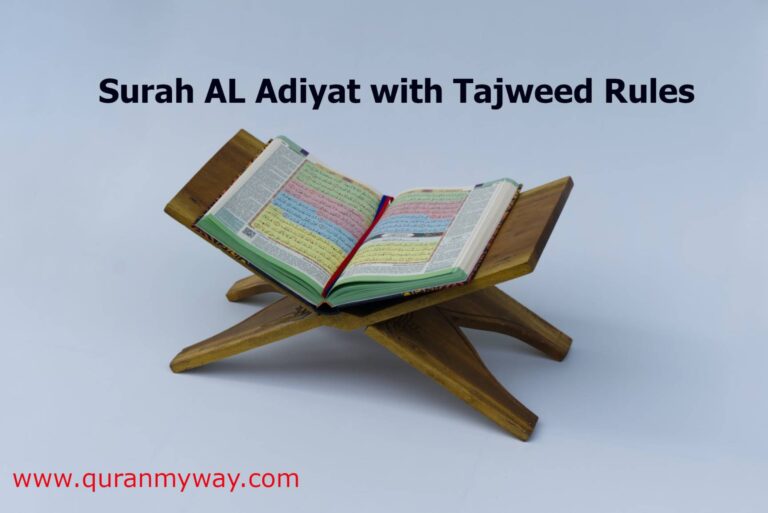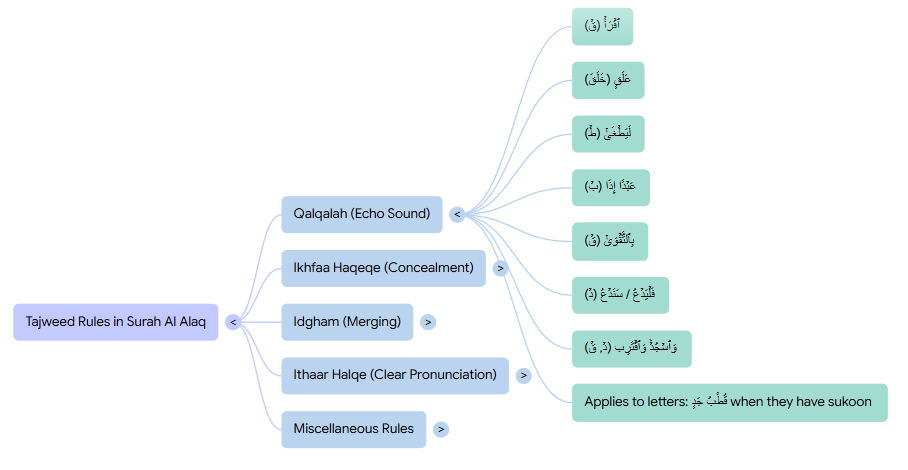 Explanation of Surah Al Alaq :
Explanation of Surah Al Alaq :
ٱقۡرَأۡ : The Qalqalah in (قۡ) echoing” sound produced when certain Arabic letters , specifically قُطْبُ جَدٍ pronounced with a sukoon
بِٱسۡمِ : It is Hamzat Al Wasl , dropping it in the middle of speech, Don’t pronounce this Hamzah Please
عَلَقٍ – خَلَقَ : Both of them The Qalqalah rules , remember Echo Sound
ٱلۡإِنسَٰنَ : It is IKhfaa Haqeqe For Noon Sakinah ( ن ) with س , In Ikhfaa Noon Sakinah or Tanween not pronounced Makhraj , only Gunnah is promounced.
ٱلۡأَكۡرَمُ : The Hams and Shaddah in (كۡ) letter , Hamse means : running Air with Letter (كۡ) , and Shadddah means stop Running Sound of letter (كۡ)
كَلَّآ إِنَّ : In Alif Maad Munfasel four or five Vowel counts (Haraqahs).
لَيَطۡغَىٰٓ : Qalqalah rules in (طۡ).
أَن رَّءَاهُ : Between (ن) and (رَّ) Idgham without Ghounnah .
إِنَّ إِلَىٰ : Noon Mushddad With Ghunnah length it two vowels counts.
Understanding the nuances of the ‘Surah Al Alaq‘ is crucial for beautiful recitation. In our structured Tajweed course, we break down each letter with live examples and personalized feedback from qualified instructors. Ready to perfect your recitation? Explore our Tajweed courses here:
See our Courses
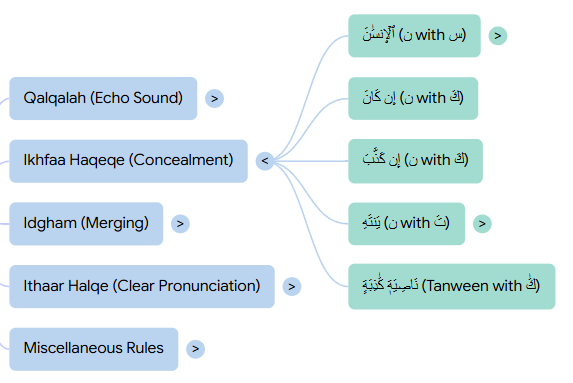
أَرَءَيۡتَ : Take care of Hamzah ( Muraqaq) and Ra’a (Mufakham) , This needs more practices and Quran’s Shiekh should helps you .
يَنۡهَىٰ : Ithaar Halqe between (نۡ) and (هَ) t means to pronounce Tanween Clearly, In Tajweed there are six Ithaar Halqe Letters ( ء – ه – ع – ح -غ – خ ).
عَبۡدًا إِذَا : Qalqalah rules in (بۡ).
إِن كَانَ : Ikhfaa Haqeqe For Noon Sakinah ( ن ) with (كَ).
أَوۡ أَمَرَ : Take care of Meem and Ra’a , Because (مَ) ( Muraqaq) and Ra’a (Mufakham) , Ra’a with Fatiha Always has Tafkheem
بِٱلتَّقۡوَىٰٓ : Qalqalah rules in (قۡ).
إِن كَذَّبَ : Ikhfaa Haqeqe For Noon Sakinah ( ن ) with (كَ).
يَعۡلَم بِأَنَّ : Ikhafaa Shafawy For (م) Meem with (بِ) Ba’a , It’s called Shavawy (Lips) because (م) and (بِ) pronounced from Lips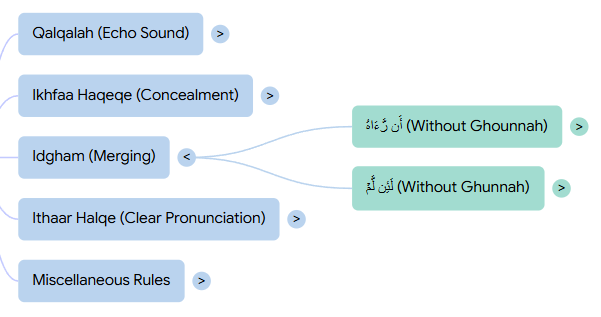
لَئِن لَّمۡ : Idgham Without Ghunnah , Noon Sakinah is followed by Lam
يَنتَهِ : IKhfaa Haqeqe For Noon Sakinah , In Ikhfaa ( ن ) is not pronounced , only Ghunnah is pronounced, There are 15 letters for Ikhfaa and تَ one of these letters.
لَنَسۡفَعَۢا بِٱلنَّاصِيَةِ : Ikhafaa Shafawy For (Tanween with Damma) with (بِ) Ba’a , Make around 2 haraks with Ghounnah.
نَاصِيَةٖ كَٰذِبَةٍ : IKhfaa Haqeqe For Noon Sakinah ( Tanween with Fatiha ) with كَٰ , In Ikhfaa Noon Sakinah or Tanween not pronounced Makhraj , only Gunnah is promounced.
كَٰذِبَةٍ خَاطِئَةٖ :Ithaar Halqe between (Tanween with Kasra ) and (خَ), pronounce Tanween Clearly, In Tajweed there are six Ithaar Halqe Letters ( ء – ه – ع – ح -غ – خ )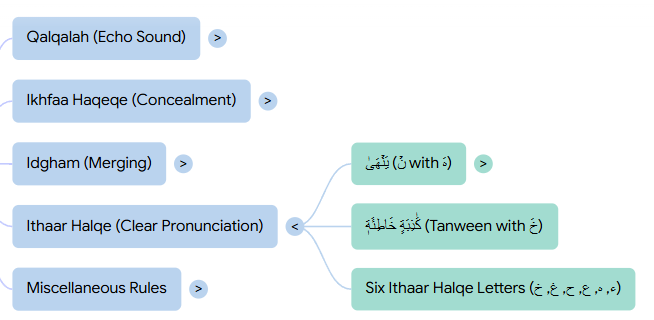
فَلۡيَدۡعُ – سَنَدۡعُ : In Both of (دۡ) Qalqalah Rules , I mentioned about this rules above many times.
وَٱسۡجُدۡۤ وَٱقۡتَرِب : In Both of (دۡ) And (قۡ) Qalqalah Rules too.
📚 Did you find this article helpful? This is just the beginning.
Imagine having a qualified teacher to guide you, answer your specific questions, and provide a structured path to mastering the Quran.
- At QuranMyWay Academy, we move beyond articles to offer:
- Live, Interactive Classes with certified teachers.
- Personalized Learning Plans tailored to your age and level.
- A Supportive Community of fellow students on the same journey.
- Direct Feedback on your recitation and understanding.
- Don’t just read about Islam; live it and understand it deeply.
Start A Free Trial

![]()
FAQ
The rule of Izhar Halqi, as seen in ‘يَنۡهَىٰ‘, applies when a Noon Sakinah or Tanween is followed by one of the six ‘Halqi’ letters. Which of the following groups contains only Izhar Halqi letters?
What characteristic sound is produced by the Tajweed rule of Qalqalah when applied to letters like ‘قۡ’ or ‘دۡ’?
What is the rule for the Hamzah in ‘بِٱسۡمِ‘ when it comes in the middle of speech, as explained in the text?
The source identifies the rule in ‘إِنَّ إِلَىٰ‘ as ‘Noon Mushddad’. What is the length of the Ghunnah (nasalization) for this rule?
In ‘كَلَّآ إِنَّ’, the source describes the rule of ‘Alif Maad Munfasel’. What does this rule pertain to?
Surah Al Alaq Translation ( Tafseer ) :
ٱقۡرَأۡ بِٱسۡمِ رَبِّكَ ٱلَّذِي خَلَقَ
Recite, bring recitation into existence, beginning with: In the Name of your Lord Who created, all creatures;
خَلَقَ ٱلۡإِنسَٰنَ مِنۡ عَلَقٍ
Created man (al-insān: the generic) from a blood-clot (‘alaq is the plural of ‘alaqa, which is a small quantity
of congealing blood).
ٱقۡرَأۡ وَرَبُّكَ ٱلۡأَكۡرَمُ
Recite: (reiterating the first one) and your Lord is the Most Generous, having no counterpart in terms of His generosity .
ٱلَّذِي عَلَّمَ بِٱلۡقَلَمِ
Who taught, [the art of] script, by the pen — the first to write with it was [the prophet] Enoch (Idrīs), peace be upon him.
عَلَّمَ ٱلۡإِنسَٰنَ مَا لَمۡ يَعۡلَمۡ
Who taught, [the art of] script, by the pen — the first to write with it was [the prophet] Enoch (Idrīs), peace be upon him
كَلَّآ إِنَّ ٱلۡإِنسَٰنَ لَيَطۡغَىٰٓ
Nay, but verily man is [wont to be] rebellious,
أَن رَّءَاهُ ٱسۡتَغۡنَىٰٓ
when he sees it, that is to say, his own soul, to be self-sufficient, in terms of wealth — this was revealed ; istaghnā, ‘self-sufficient’, is the second direct object; an ra’āhu, ‘when he sees it’, is an object denoting reason).
إِنَّ إِلَىٰ رَبِّكَ ٱلرُّجۡعَىٰٓ
Surely to your Lord, O man, is the return [meant as] a threat for him — and so He will requite the rebellious one with what he deserves.
أَرَءَيۡتَ ٱلَّذِي يَنۡهَىٰ
Have you seen (a-ra’ayta in all three instances [here and below] is an exclamation of wonder) him, namely, Abū Jahl, who forbids
عَبۡدًا إِذَا صَلَّىٰٓ
A servant, namely, Muhammad (s), when he prays?
أَرَءَيۡتَ إِن كَانَ عَلَى ٱلۡهُدَىٰٓ
Have you considered what if he, the one forbidden, should be upon [a path of] guidance.
أَوۡ أَمَرَ بِٱلتَّقۡوَىٰٓ
Or (aw is for division) be bidding [others] to fear of God?
أَرَءَيۡتَ إِن كَذَّبَ وَتَوَلَّىٰٓ
Have you considered what if he, the one forbidding the Prophet, should be denying [God’s guidance] and turning away?, from faith.
أَلَمۡ يَعۡلَم بِأَنَّ ٱللَّهَ يَرَىٰ
Is he not aware that God sees?, what has issued from him, that is to say, He does [indeed] know it and will
requite him for it.
كَلَّا لَئِن لَّمۡ يَنتَهِ لَنَسۡفَعَۢا بِٱلنَّاصِيَةِ
No indeed! — a repudiation of him — Assuredly if (la-in: the lām is for oaths) he does not desist, from the disbelief that he is upon, We shall seize him by the forelock, We shall drag him to the Fire by his forelock,
نَاصِيَةٖ كَٰذِبَةٍ خَاطِئَةٖ
a lying, iniquitous forelock! the description of this [forelock] in such terms is meant figuratively, and what is actually meant is that individual.
فَلۡيَدۡعُ نَادِيَهُۥ
Let him, then, call upon [the henchmen of] his council, the members of his council (nādin) — a place of assembly where people gather to talk. He [Abū Jahl] had said to the Prophet (s) in reproof, having forbidden him from prayer, ‘You are well aware that there is none in this [town] who has [recourse to] as large a council [of men] as I do.
سَنَدۡعُ ٱلزَّبَانِيَةَ
We shall call the Zabāniya, the grim stern angels to destroy him, as [stated] in the hadīth, ‘Had he called his
council [of henchmen] together, the Zabāniya would have seized him right before his own eyes!’.
كَلَّا لَا تُطِعۡهُ وَٱسۡجُدۡۤ وَٱقۡتَرِب۩
No indeed! — a repudiation of him — Do not obey him, O Muhammad (s) and abandon prayer, and prostrate yourself, perform prayer to God, and draw near, to Him through obedience to Him.

